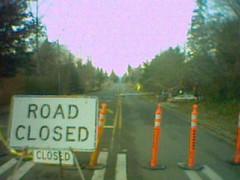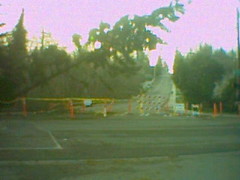Click on the title above for a humorous video in which New York Times columnist David Pogue explains that Windows Vista isn't a copy of Mac OS X.
Friday, December 29, 2006
Tuesday, December 19, 2006
Storm Aftermath 2
Posted by
Michael Stiber
|
12/19/2006 12:23:00 PM
|
6
comments
|
![]()
Labels: photos
Monday, December 18, 2006
Storm Aftermath 1
Posted by
Michael Stiber
|
12/18/2006 11:17:00 AM
|
0
comments
|
![]()
Labels: photos
Thursday, December 14, 2006
Spam choking the internet again
The title links to a New Scientist article about spam. Yes, the volume of spam just about doubled again this past year, and makes up 91% of all email. Is this merely a realization of Sturgeon's Law?
What bothers me is the "again" part of the headline. This implies that there was at least some short interval during which people thought that spam was in some small way "solved," or at least not so important. But I don't see any evidence for that. What we have is an arms race between spammers and spam filters, and there's no reason that the spammers won't be able to stay ahead of the filters. Take image spam. People are actually working on spam filters that incorporate image analysis to try to determine whether the images in emails are spam or not. This is ludicrous! Do we really need to incorporate CPU-hogging image processing into our email programs (I did a fair amount of computer vision research in grad school, so I have an idea of the computational requirements)? Considering the difficulty of solving the problem of computer vision, this is an arena in which the spammers will beat filters' brains out for years -- decades even -- to come. I finally just wrote a rule in my email program that automatically junks email that only contains images.
And this is all besides the point, to me. Considering the content of some of the spam I get (even the subject lines), I wouldn't let my daughters have email accounts until they're 30. To me, that's the biggest danger of spam: not the massive waste of computational and network resources, but that it renders email practically unusable for a big segment of society.
Posted by
Michael Stiber
|
12/14/2006 08:05:00 AM
|
3
comments
|
![]()
Tuesday, December 12, 2006
Holiday tipping etiquette
I Google so you don't have to.
Posted by
Michael Stiber
|
12/12/2006 08:04:00 AM
|
0
comments
|
![]()
Monday, December 11, 2006
Two sites suffice
After a week of my musings on interdisciplinarity producing no Google hits for the term "exodisciplinarity", this post on my blog produced immediate results. "Exodisciplinarity" now produces a single hit on Google. (Of course, I understand that their algorithm is more sophisticated than that.)
I wonder what that implies for monetizing this blog?
Posted by
Michael Stiber
|
12/11/2006 08:13:00 AM
|
0
comments
|
![]()
Sunday, December 10, 2006
A pointless experiment
I got curious about how little "significance" a web page can have and still get indexed by Google. In this case, I merely defining significance as being number of links to that page. So, I wrote a few thoughts about interdisciplinarity in my academic web a week ago, noting that the term "exodisciplinarity" returns no Google hits. The only link to that page is from my home page. A week later, still no hits for "exodisciplinarity". So let's see if the link (and mention of the term) in this blog post, being on another web site, will suffice.
And, in case you think the term is silly, do you really think that "pluridisciplinarity" merits 821 hits?
Posted by
Michael Stiber
|
12/10/2006 12:45:00 PM
|
0
comments
|
![]()
Saturday, December 09, 2006
More about student podcasting
Adrian comments (link from title) on my musing about incorporating podcasting into my classes. He has a very good point:
I have a ’sustainable teaching’ rule. Which is that if the use of a technology, or methodology, leads to more assessment or teaching load, then it probably isn’t a good idea... Rather than have students interview me, I’d get a group, let’s say four, to do research around idea n, and they are to then have a structured conversation about the idea.Too often I (and perhaps others?) tend to think of teaching as me, rather than the students, doing something. That is clearly not the case. Like anything else, we only have so much time we will devote to teaching; more time on X means less time on Y. For those of us making the transition from "old style" teaching to newer approaches, the change in viewpoint involves spending more time in course, assignment, project, infrastructure, etc. development and less time as the center of in-class attention.
On the legal front, it appears that posting podcasts so that they are accessible by individuals outside the classroom may be problematic. The solution I've found is authentication supported by UW's web servers (access lists are updated nightly by the Registrar's office) and the rss2html.php script to generate an HTML view of the podcast feed (since podcatching clients won't be able to subscribe to the restricted-access feed).
Posted by
Michael Stiber
|
12/09/2006 12:25:00 PM
|
0
comments
|
![]()
Labels: multimedia, teaching, technology
What I learned about bicycle commuting this week
1. You don't want to take a turn at 20 miles/hour when there's still sand on the road from a recent snow.
2. Plain gauze bandages get embedded in newly-formed scabs.
Posted by
Michael Stiber
|
12/09/2006 11:54:00 AM
|
0
comments
|
![]()
Labels: bicycling







